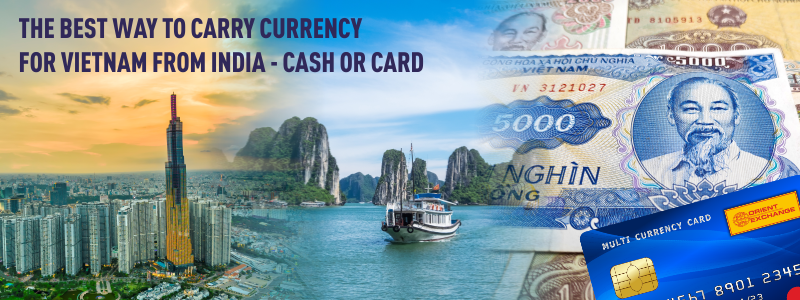The best way to carry currency for Vietnam from India - Cash or Card

Summary: In this blog , you will dicover the best way of carring your forex abroad . where understanding of currency options helps you trave confidenly and enjoy your journey without any hassle.
Embarking on a journey to Vietnam from India is always an exciting prospect. It can be a journey with the promise of vibrant cultures, stunning landscapes, and unforgettable experiences. However, amidst the anticipation, travelers often face a common dilemma about the best way to carry currency for a hassle-free trip.
The choice between cash and cards can impact your travel experience. It is thus beneficial to weigh the pros and cons of each option. This article explores the pros and cons of carrying cash, using international credit/debit cards, and relying on travel cards. Understanding these aspects will help you plan better for your Vietnam trip.
Understanding the currency options
Here are the various currency options and their pros and cons.
- Cash
When it comes to foreign exchange, carrying cash is a traditional yet reliable option. However, it requires careful planning for a smooth travel experience.
- Tips for carrying cash
- Secure your cash smartly
When carrying cash for your Vietnam trip, prioritize security. Invest in a quality money belt or concealed pouch to keep your money close to your body. It will minimize the risk of theft. Moreover, avoid displaying large amounts of cash in public spaces. Consider dividing your money into multiple pockets to ensure you're not left empty-handed in case of loss or theft.
- Exchange currency before departure
Plan and exchange your Indian Rupees for Vietnamese Dong (INR to VND) before leaving India. Look for authorized INR to VND foreign exchange providers to get competitive rates. A sufficient amount of VND in hand upon arrival in Vietnam ensures you remain prepared for initial expenses like transportation, meals, and small purchases.
- Secure your cash smartly
- Where to exchange currency in India
Before boarding your flight to Vietnam, you should exchange your Indian Rupees for Vietnamese Dong (INR to VND) at authorized foreign exchange providers. Foreign currency exchange services and online currency platforms are viable options to buy VND at competitive rates.
- How much cash to carry
Determining the amount of cash to carry depends on your travel plans and spending habits. While having enough for daily expenses is crucial, avoid taking excessive amounts. Consider the appropriate cash reserve for accommodation, meals, transportation, and activities.
- Advantages of carrying cash
Here are some advantages of carrying cash.
- Widely accepted
Cash is universal in Vietnam, especially in markets, local establishments, and smaller towns where cards may be less used.
- Avoiding additional costs
Unlike credit/debit cards, cash transactions eliminate the risk of cross-currency charges or dynamic currency conversion fees for a more cost-effective solution.
- Emergency preparedness
Cash can be a lifeline in emergencies where cards may not be accepted or accessible. Having a reserve of VND ensures you remain prepared for unforeseen circumstances.
- Widely accepted
- Tips for carrying cash
- International credit and debit cards
While cards are convenient for everyday transactions, relying solely on them during your Vietnam trip may not be the best choice.
- Disadvantages
Here are some disadvantages of credit and debit cards.
- High additional costs
International transactions often come with high fees, including foreign transaction fees, currency conversion charges, and ATM withdrawal fees. These additional costs can accumulate quickly to impact your travel budget.
- Limited acceptance
In some remote areas or smaller establishments, cards may not be accepted. It's crucial to have an alternative means of payment, like cash, to avoid inconveniences.
- High additional costs
- Disadvantages
- Travel card
A travel card or Forex card is a popular option for international travelers, offering the convenience of plastic without the drawbacks of traditional credit/debit cards.
- Advantages
Here are the advantages of travel cards.
- Security
Travel cards have added security features, including PIN protection and the ability to lock the card in case of theft.
- Convenience
A single currency card, loaded with VND, can offer more control over your spending and eliminate the risk of dynamic currency conversion fees.
- Security
- Disadvantages
Here are the disadvantages of travel cards.
- VND not available
Vietnamese Dong is a rare currency on travel cards. This limitation can lead to additional cross-currency charges when using the card for transactions in Vietnam.
- High ATM charges
While travel cards are more secure than carrying large amounts of cash, they may incur high ATM withdrawal charges. You must know these fees and factor them into your travel budget.
- VND not available
- Advantages
Bottom line
Choosing the right currency option for your Vietnam trip is a crucial decision that can impact the cost-effectiveness of your journey. While both cash and cards have their advantages and disadvantages, it's evident that carrying a reasonable amount of Vietnamese Dong in cash provides a reliable and widely accepted payment method. To avoid the high additional costs associated with international credit/debit cards and the limitations of travel cards, it's suitable to buy VND in cash before your departure.
If you are looking for a reliable option to buy VND in cash, Orient Exchange is here to help you. Contact us today to learn more details about our services.
• · ✦ · • Article Ends Here • · ✦ · •
Contact Us